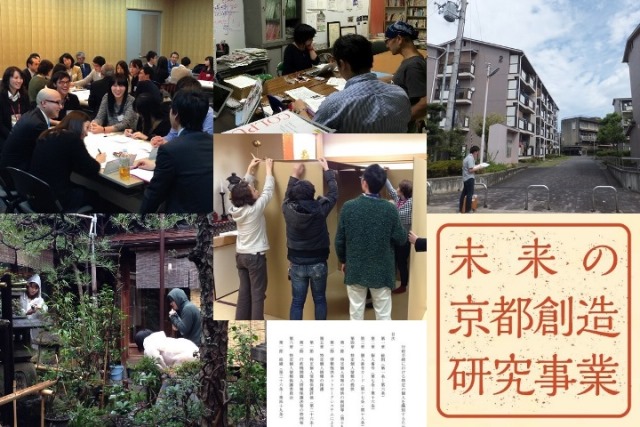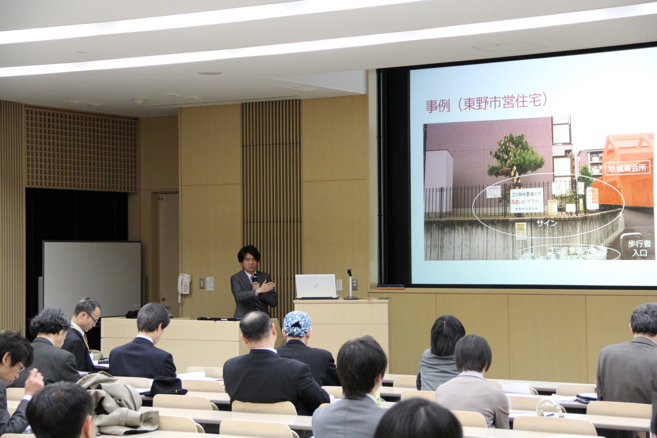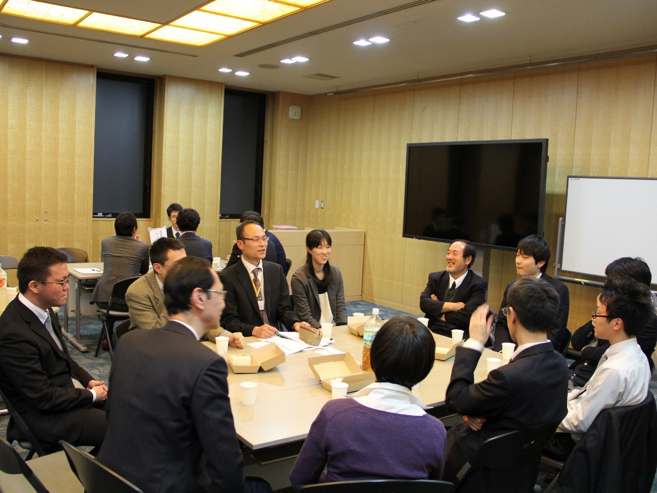Business Overview
By utilizing the creative and academic research results of university researchers in Kyoto City’s policies and projects, we aim to return the knowledge of university research to the local community and society. From the planning stage, researchers and the department in charge of Kyoto City have been working together to promote research, and we are aiming to form a network based on the surveys and research of this project by holding results report meetings to widely disseminate and share the results of this research, as well as exchange meetings between researchers, citizens, city officials, students, etc.

Research Report
Research Report
This is a report on the results of surveys and research adopted in FY2014.
*The title of the principal investigator and the name of the research cooperating department are as of the time of adoption.
Designated Assignment 1
Act on the Use of Numbers to Identify a Specific Individual in Administrative Procedures (hereinafter referred to as the “Number Act”). Research on the protection, management, use, and utilization of personal information in connection with the enforcement of the above
Same as
| Research Theme |
Designation Project 1 |
| Principal Investigator: |
Professor Akihiro Saeki, Faculty of Law, Doshisha University |
| Outline of the research Starting |
with the notification of individual numbers to each citizen in October 27, the My Number system will be implemented sequentially. Prior to the full-scale implementation of the system, this study aims to explore how individual numbers can be utilized based on the “Number Law,” which is the underlying law, and the ordinances enacted by Kyoto City based on the law. |
| Joint Research: |
Kyoto City Staff Legal Affairs Study Group |
| Department in charge: |
General Planning Bureau, Information Technology Promotion Office, Numbering System Planning |
| Research Reports |
Research
Results Report  |
Designated Assignment 2
Research on the creation of a place for interaction between merchants and others in the urban area (the area bounded by Shijo-dori, Kawaramachi-dori, Oike-dori and Karasuma dori and the surrounding area)
| Research |
ThemeEmpirical research related to the formation and development of networks of merchants and citizens by creating a place for exchange |
| Principal Investigator |
Department of Design, Graduate School of Crafts and Sciences, Kyoto Institute of Technology
Associate Professor Masanobu Nishimura |
| Outline of the study In |
recent years, the annual sales value of the retail industry in the central area of Kyoto City (Kyoto Machinaka) has been decreasing. As competition between cities is expected to intensify in the future, in order to overcome this, it is necessary to revitalize the city of Kyoto by creating a place for exchange in the region and forming a human network of merchants and citizens. Therefore, in this study, we attempted to create a place for exchange that connects various individuals and groups such as merchants in the city of Kyoto, and demonstrated the ideal place for the formation of a human network in the city of Kyoto. |
| Division: |
Commercial Promotion Division, Commerce and Industry Department, Industry and Tourism Bureau |
| Research ReportsResearch |
Results Report  |
Designated Assignment 3
Analysis of trends in employment after graduating from university and research on support measures by local governments, companies, and universities
Same as
| Research Theme |
Designation Project 3 |
| Principal Investigator: |
Kazuhiko Ishihara, Director, Career Center, Ritsumeikan University and Professor, Faculty of Policy Sciences |
| Outline of the research In |
addition to analyzing the motivations and reasons for international students in Kyoto, mainly Ritsumeikan University, to work for Japan companies, the abilities that can be utilized in companies, future prospects, etc., we conducted a questionnaire survey on the abilities required of international students by companies, expectations for recruitment effects, and the actual turnover of international students. Measures to be taken by each university were examined. |
| Department in charge |
(Kyoto City) University Policy Office, Planning Bureau, International Promotion Office
Industrial Policy Division, Industrial Strategy Department, Industry and Tourism Bureau, Small and Medium Enterprise Promotion Division, Ministry of Commerce and Industry
(University Consortium Kyoto) Research & Public Relations Division |
| Research ReportsResearch |
Results Report  |
Free Assignment 1
| Research Themes |
Spatial Composition and Transition in Municipal Housing in the Suburbs of Kyoto City and Surrounding Residential Areas
-Through a fact-finding survey of autonomous operation by residents of municipal housing- |
| Principal Investigator: |
Tetsuya Masaki, Ph.D. Student, Department of Crafts Science, Kyoto Institute of Technology |
| Outline of the Research In |
the suburban residential areas of Kyoto City, the outdoor space of public rental housing has become a valuable vacant space and green space in the community, and it is hoped that it will be maintained and utilized as a local asset in the future. In particular, the small-scale municipal housing distributed in Yamashina Ward and the eastern part of Fushimi Ward, Kyoto City, which was selected as the subject of the survey, was small, so it was easy to understand how it interacted with the surrounding residential areas, and we aimed to understand the regional characteristics of each by comparing them with municipal housing. Therefore, the purpose of this paper is to clarify the spatial relationship between the outdoor space of municipal housing and the surrounding area through the actual operation of the residents’ autonomous outdoor space, and to link the findings to the policy recommendations of Kyoto City. |
| Department in charge: |
City Planning Bureau, Housing Office, Housing Development Division |
| Research ReportsResearch |
Results Report  |
Free Assignment 2
| Research Theme: |
Research on next-generation citizen collaboration policies using the Future Center in Kyoto City |
| Principal Investigator: |
Lecturer, Faculty of Public Policy, Kyoto Prefectural University |
| Outline of Research |
The purpose of this study is twofold. The first is to focus on the “Future Center,” which has been attracting attention as a method of solving problems in recent years, and to clarify the current situation in each sector of industry, academia, and public NPOs in Japan. The Future Center is “a dedicated space for diverse people to gather and engage in good dialogue.”
The second is to clarify the current status of policies to promote citizen collaboration in Kyoto City, and based on the results, make recommendations for next-generation citizen collaboration policies that utilize the Future Center in Kyoto City. |
| Department in charge |
Citizen Collaboration Section, Citizen Collaboration Policy Promotion Office, Planning Bureau
University Policy Officer, Policy Office, Planning Bureau |
| Research ReportsResearch |
Results Report  |
Free Assignment 3
| Research Theme: |
Environmental
Effects of Residential Gardens and Their Reduction on the Biota of Urban Blocks in Kyoto City |
| Principal Investigator: |
Professor Shozo Shibata, Graduate School of Global Environmental Studies, Kyoto University |
| Outline of the research The |
purpose of this study was to clarify the characteristics of the quantitative transition and distribution of the town family garden group due to the decrease in the number of Kyoto machiya houses, and to clarify the multifaceted value of the town family garden group as an urban green space by evaluating the environment of the town family garden group as a biological growth space. The target of the survey was the former Momozono School District in Kamigyo-ku, Kyoto City, and a survey on the distribution and quantitative transition of the town family garden using GIS, and a field survey of the town family garden and interviews with residents were conducted. |
| Division: |
Environmental Management Division, Environmental Planning Department, Environmental Policy Bureau |
| Research ReportsResearch |
Results Report  |
Achievement debriefing and networking events
In addition to holding a report meeting to widely disseminate and share the results of the six surveys and research projects adopted in fiscal 2014, we also held the following exchange meetings to promote exchanges between researchers beyond the boundaries of universities and laboratories, as well as between researchers and citizens, students, government officials, etc.


- Re
- Tuesday, March 17, 2015 17:00~21:10
- place
- Campus Plaza Kyoto
17:00~ Achievement debriefing session 4th floor Lecture Room 3
20:20~ Reception Meeting 2nd and 3rd Conference Rooms on the 2nd floor
- substance
- (1) Achievement debriefing session (91 participants)
Six researchers selected this year presented their survey and research results.
(2) Networking event (62 participants)
Based on the results report, opinions were exchanged between researchers, citizens, Kyoto City officials, and others.
(3) “Future Kyoto Creation Research Project” Achievement Report Meeting and Exchange Meeting Flyer [Click here for details]
Research News
The progress of surveys and research is introduced.
“Future Kyoto Creation Research Project” Research Report No. 1 [Click here for details]
“Future Kyoto Creation Research Project” Research Report No. 2 [Click here for details]
“Future Kyoto Creative Research Project” Research Report No. 3 [Click here for details]
“Future Kyoto Creation Research Project” Research Report No. 4 [Click here for details]
“Future Kyoto Creative Research Project” Research Report No. 5 [Click here for details]
Inquiries
University Consortium Kyoto Future of Kyoto Creative Research Project: Mizuta, Yano
E-mail:mirainokyoto■consortium.or.jp TEL:075-708-5803
(Please replace ■ with @.) )



















